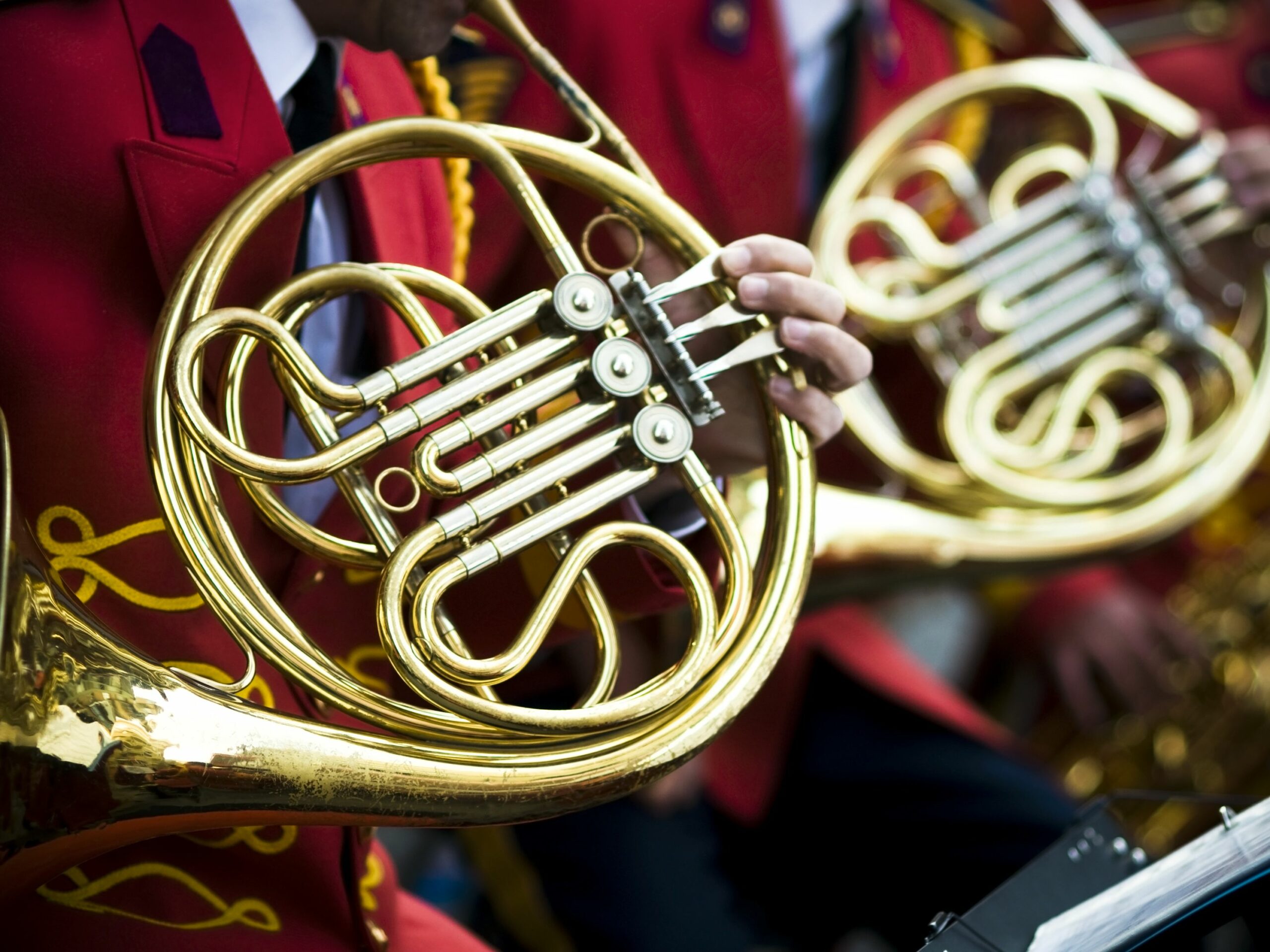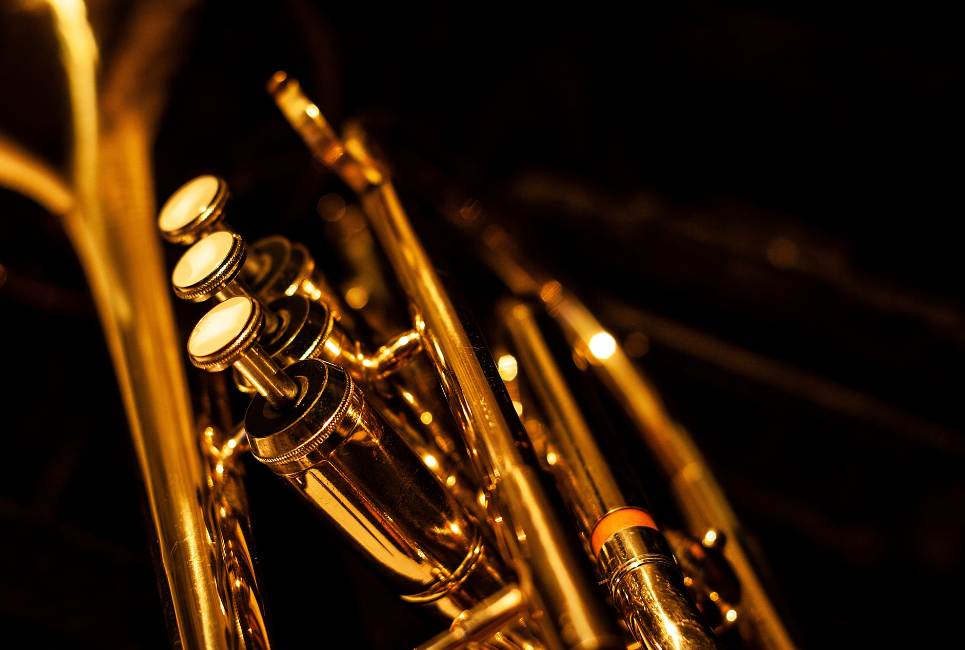- Top Trumpet Embouchure Techniques: Options for Beginners Through Professionals - October 12, 2022
- Is the Trumpet Hard to Learn? - September 30, 2022
- Best Leblanc Clarinet Models Guide: From Soprano to Contrabass - September 5, 2022
Do you want to play in both brass and woodwind groups? Is classical more your style than jazz? You should know how to find the best French horns as a beginner and once you gain experience.
That way, you can give yourself the best chance of learning and play well. Whether the horn is your first instrument or not, you should shop around to find one that’s right for you.
What Is The French Horn?
The French horn is a member of the brass family, and it covers the middle range. Even though the trumpet plays a bit higher, the French horn comes before it in a full orchestral or band score.
This instrument has its own family of instruments, including the single F horn and the B flat single horn. There’s also the F/B flat double horn, which is common among professionals and advanced players.
You can even find a triple horn with the same range, but it helps keep the higher notes consistent. Oh, and the French horn isn’t actually French at all; it’s German.
How To Find The Best French Horns
If you want to learn how to play the French horn, you need to know how to find a good instrument. The horn is hard enough to learn and play well, so you don’t want to add extra obstacles, like a low-quality horn.
Even though the horn isn’t the most popular instrument, you can find plenty of models available. That way, you can test them out and see which is the best fit for you.
Whether you’re looking for your first horn or are ready for an upgrade, here are some steps for how to find the best French horns.
Single Or Double Horn
One thing to consider before you start looking at horns is if you want a single or double horn. The double horn is more common, and it offers more range and flexibility.
However, the single horn can be easier to hold since it’s not as heavy. Single horns are also more affordable, so they’re great for students.
But you may find you outgrow a single horn more quickly than you would a double horn. If you plan to stick with the French horn for a while, getting a double horn now will be a better investment.
Before buying a double horn, consider if you want one with a Geyer wrap or Kruspe wrap. Kruspe wrap horns add more resistance, which can make the instrument sound darker. The Geyer wrap is better for students because it’s less resistant.
Start Saving
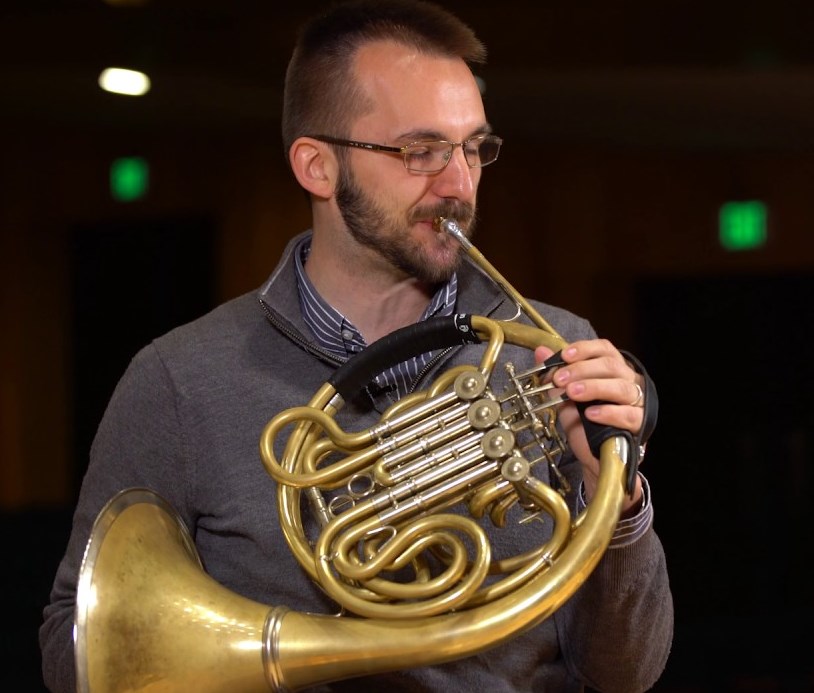
No matter which type of instrument you want, you should start saving your money. The French horn can be expensive, even at the beginner level, and you don’t want to compromise on the quality just to pay less.
If you want to buy an intermediate instrument, you’ll need even more money than a student. That way, you can afford to get the best French horn for you so that you can improve and play more difficult music.
Even if you’re going to rent or borrow a horn, it can’t hurt to save for potential purchase. Then, you can buy when you find a good instrument, and you won’t have to force yourself to play a model that no longer works for you.
Look For A Used Horn
Used French horns can come on the market occasionally, and they’re a great option when you want to save money. My parents bought my sister her horn used from a local college student, and they got a good deal.
If you need a double horn or an instrument with more features, you might not have the money for a new one. Or if you’re looking for your first horn, the lower cost can make buying less of a risk.
However, be careful when buying used instruments. Ask the seller when the instrument last had regular maintenance, and consider if you can try it out before your purchase to make sure it’s in good condition.
Consider Renting
If you can’t find any used horns for sale near you but can’t afford a new one, look into renting. You can usually rent a French horn from your school or a local music store.
Renting is an excellent option for beginners who aren’t ready to buy a horn. Use the rental to start learning the instrument and decide if you want to continue with it.
In some cases, you can even rent to own the horn, so the store will apply your rental payments toward your purchase. That way, you can keep the French horn after the rental period ends.
Get A Good Mouthpiece
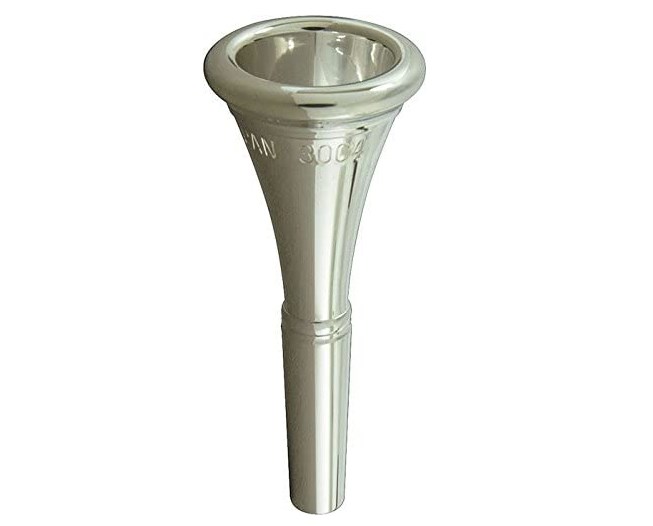
If you can’t get your hands on a full horn but want to start learning the basics, buy a French horn mouthpiece. The mouthpiece lets you practice forming an embouchure and buzzing your lips to make a sound.
When you first start playing the horn, getting a sound is difficult, so it can impede your ability to compare different models. By practicing the embouchure now, you’ll be able to focus on testing each instrument.
You can then use that mouthpiece to test different horns since you’ll know how you need to form your lips. Using the same mouthpiece on different horns can also help control your trials so that you can determine if the instrument is good.
Test The Entire Range
Once you’re able to test out some French horns, consider how to try them. You should test the extreme low and high notes so that you can tell how the instrument sound and feels to play.
Try playing soft and loud to determine how easy it is to play at different dynamic levels. Consider how easy it is to switch between different notes that use the same fingering.
If you struggle to hit certain notes, that can be a sign the horn isn’t a good fit. On the other hand, playing different notes with ease means there’s a good chance you’ll like that model.
Implement Controls
When you test different horns, try to control the test as much as you can. Use the same scales and other musical excerpts, bring your mouthpiece and use that on each instrument.
Try the instruments in the same place and at the same time of day. By controlling these factors, you can limit the potential causes of why an instrument sounds better or worse.
That way, your focus will be on the instrument itself rather than the music you use to test it. While your decision may still be subjective, having some controls may help you decide between two instruments if you can’t choose otherwise.
Bring Your Tuner
Another thing to check for when testing some of the best French horns is to use a tuner. You may love how the horn sounds and feels to play, but poor intonation can make all of that go away.
If you can’t get the horn to play or stay in tune, nothing else matters. Whether the slides can’t stay in place, or you can’t use enough air to support the pitch, move to another model.
You shouldn’t have to struggle to keep the instrument sounding good. Consider trying other individual horns of the same model because the issue could be with that one serial number.
But if it happens again, you shouldn’t buy that model. Keep trying instruments until you find one that stays in tune and that you enjoy playing.
Give Yourself A Break
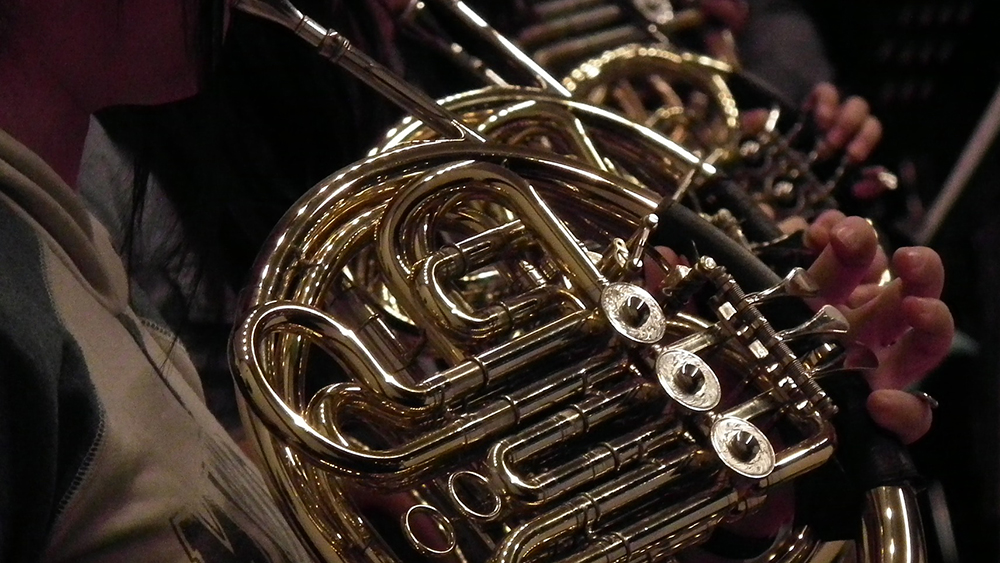
Playing the French horn can take a toll on your chops, especially if you spend all day trying instruments. Take plenty of breaks throughout the day so that you can stretch and give your lips some room to breathe.
If you don’t give yourself a break, you might struggle to play the second, third, and fourth horns you try. While the first one may be the right fit for you, it could be that you had more energy and endurance.
Breaks can help you reset, so you can give each model you try a good chance at performing well. Then, you can minimize the potential for that bias affecting the instrument you buy.
Record Yourself
Another benefit of taking breaks during your trial is that you can listen to a recording of yourself playing. When you test each horn, record yourself on your phone and label the recording with the model in question.
Then, you can listen back and compare recordings of the same music on different instruments. Sometimes while you play, you have to focus more on the music than listening to how it sounds.
A recording allows you to sit back and listen to the tone quality and colors that you can get out of the horn. You can also send recordings to other musicians you know, even if they aren’t with you in person.
Bring A Friend
If you can, consider asking another horn player or musician to come with you to test instruments. You can get their feedback since they can hear certain things live that you may not notice in a recording.
Another horn player can even play the instrument for you to listen live. While you may play the instrument slightly differently, you might find you like an instrument more or less after hearing someone else play.
Your friend can also give you unbiased opinions, especially if you don’t tell them the brand or model. That can be nice since a sales representative might encourage you to buy a horn that you don’t love just to make a sale.
The Best French Horns
There are tons of French horns available on the market, but some are much better than others. Students and professionals should know which models to try when searching for the best of the best.
That way, you don’t have to waste time on instruments that sound bad or that will break in a few months. Luckily, you can find good French horns at a variety of levels and price points.
Here are a few models to try when shopping for your next French horn.
Yamaha YHR-314II
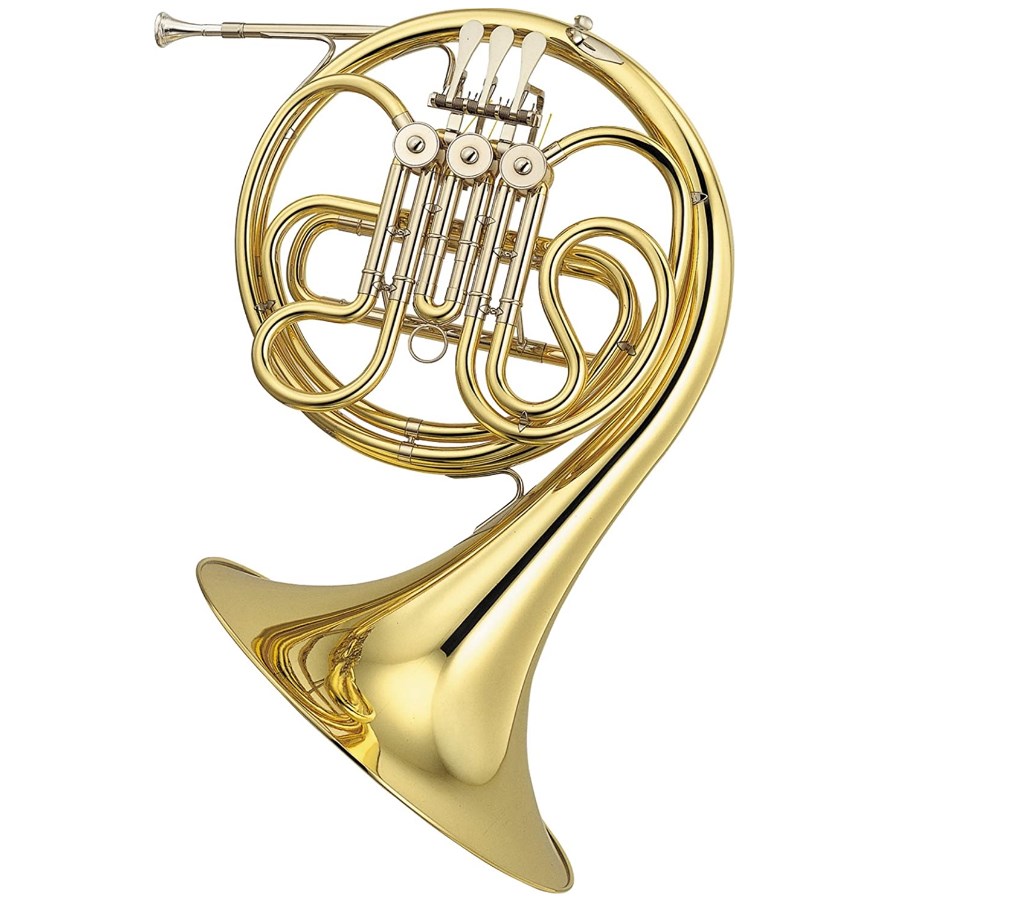
The Yamaha YHR-314II is an excellent single horn for beginners. It’s lightweight so easy to hold, and beginners can learn a lot of basic music on it.
You can get a good sound, even when you’re first learning, and it’s in the key of F. That allows you to play standard horn parts, even without the double horn design.
The mouthpiece taper helps the intonation, and the response is great. It also helps you play comfortably, and the slides won’t corrode as easily as some horn slides.
Pros
- Great for students
- Easy to hold
- Stable intonation
Cons
- A single horn can be limiting
Yamaha YHR-567
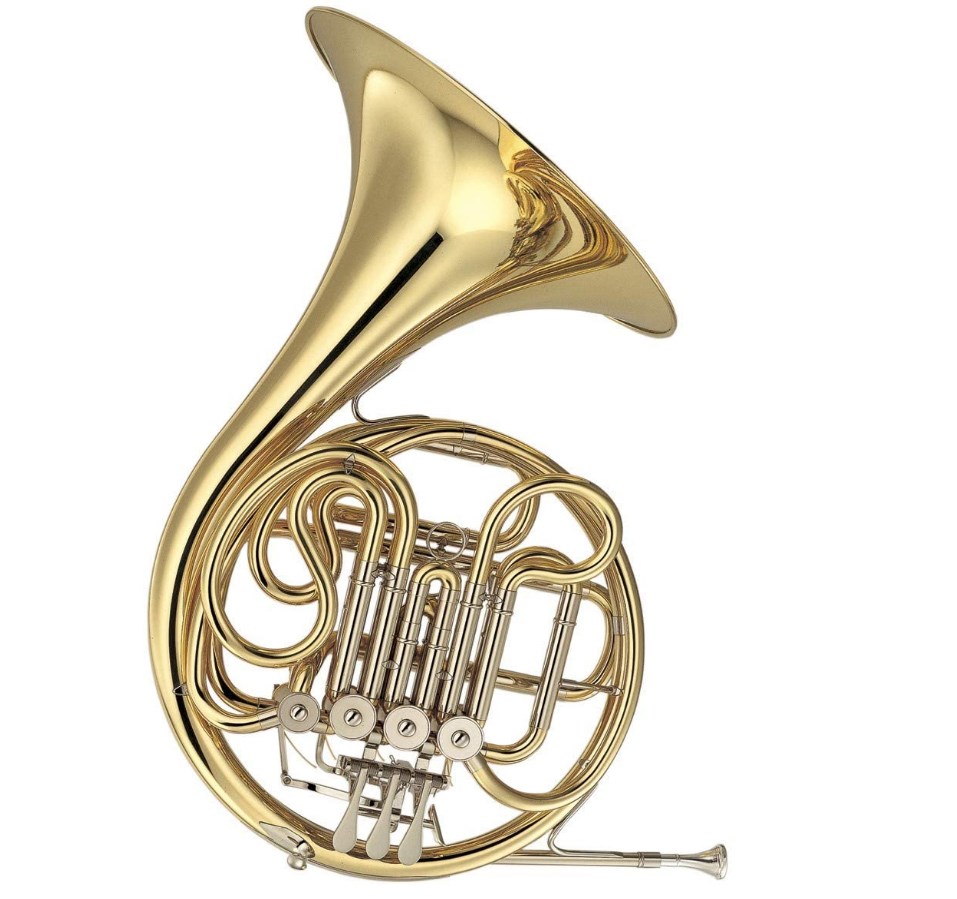
Another excellent horn to consider from Yamaha is the model YHR-567. This horn has the same tapered design near the mouthpiece, so it has a great response and intonation.
Also like the other Yamaha, this horn provides a comfortable position for your hand. And you can adjust the position of the thumb valve, so you can keep from straining your hand while you play.
The horn is a double horn, which allows you to play the full range of the instrument. If you want a detachable bell, you can get the 567D model, but the standard model has a set bell.
Pros
- Ergonomic and comfortable
- Good for students and advancing players
- Double horn
Cons
- Can’t take the bell off
Conn 6D
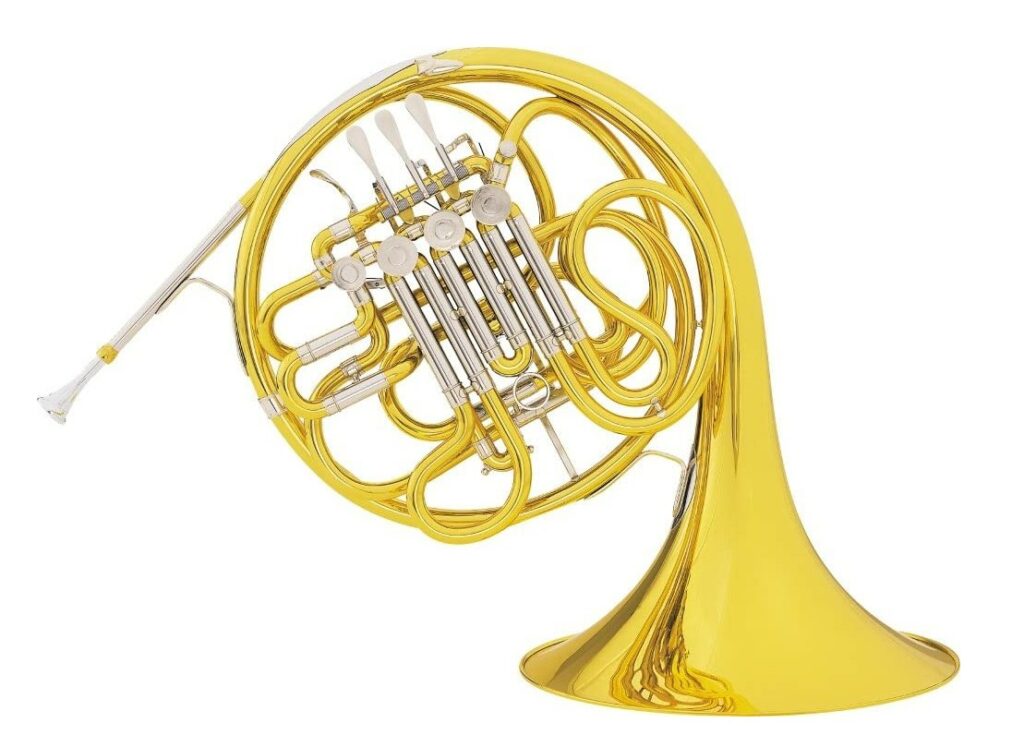
If you’re an advanced student or aspiring professional, you can’t go wrong with the Conn 6D. The horn features a yellow brass bell and nickel outer slides with a clear lacquer on the outside.
You can control the instrument easily, so it’s suitable for intermediate through professional players. It also makes for a great first double horn, and you can play it for a while.
The model comes with a protective case and a Conn horn mouthpiece. That way, you’ll have everything you need to play and protect the instrument.
Pros
- Great for students and professionals
- Versatile
- Good quality
Cons
- Can’t take the bell off
Holton H379
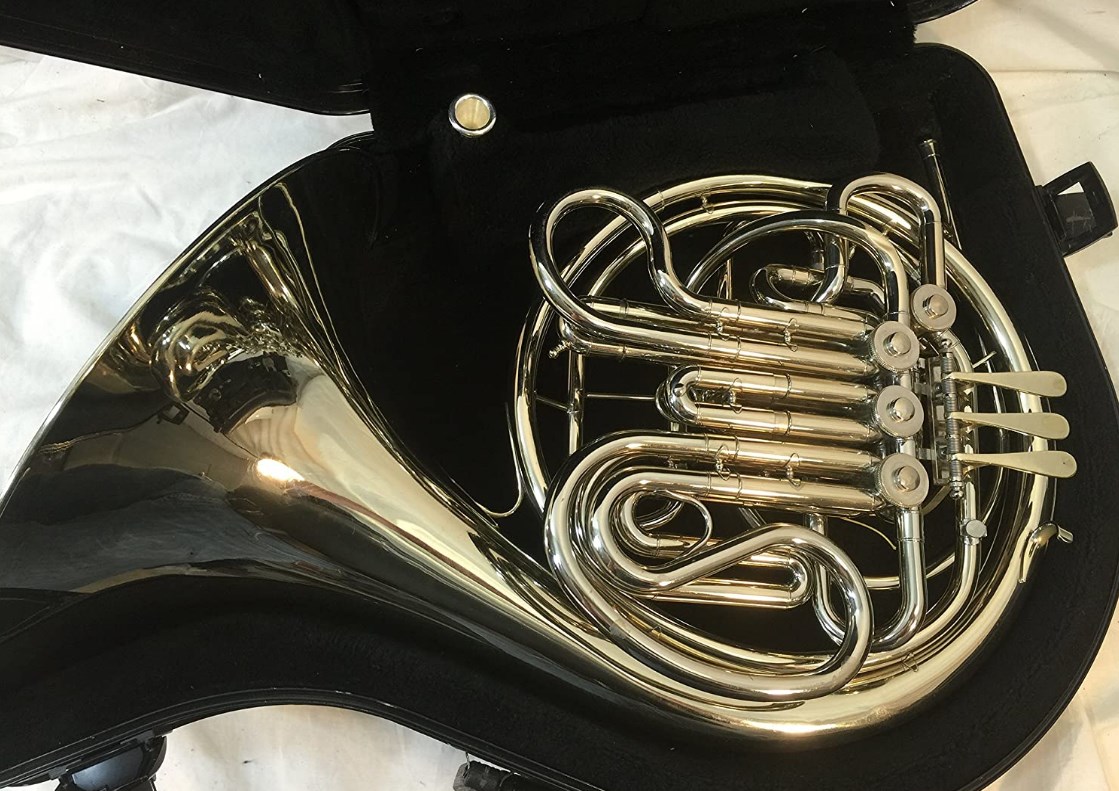
The Holton H379 horn is another fantastic choice for advancing musicians. It has a fixed bell and mouthpiece lead pipe, so it’s easy to put together and take apart.
This model can provide a dark tone, and it’s easy to project your sound in a performance. The nickel silver does add some brightness to the sound, and it also helps the horn respond quickly.
Holton hand-fits the rotary valves, so the response can be precise. It’s a professional-level French horn, but it doesn’t cost nearly as much as some instruments.
Pros
- Great sound
- Easy to play
- Precise fitting
Cons
- No detachable bell
FAQs About How To Find The Best French Horns
Answer: Features to look for in a good French horn include a single or double horn, a good brand, and quality materials. You should also consider if it comes with a mouthpiece or not.
And if you want to save space when traveling, you may want a horn with a detachable bell. However, that isn’t necessary, so don’t ignore other models just because of that feature.
Answer: Decent French horns start at about $1,200 to $3,000 or so for a student model. Intermediate models cost anywhere from $3,000 to $4,500, while professional models are more expensive.
However, you may find exceptions to that rule. As long as you can afford the instrument and like playing it, the level isn’t super important.
Answer: Unfortunately, cheap French horns usually aren’t worth their price. The instrument might break and need repairs soon after you get it, and some repair technicians won’t touch cheap models.
In other cases, the instrument may not be repairable at all. It’s better to save a little more money to get a horn from a reputable brand. Then, you can repair it if something goes wrong, and it will last much longer.
Answer: Renting is a fantastic option for new French horn players. You can get your hands on a good instrument without having to commit to paying the full price.
However, once you know you want to play the instrument for a while, you should buy one. That way, you won’t have to spend money on rental fees each month.
Answer: The French horn’s written range starts at the F (F2) just below the bass clef, and it goes up to the C above the treble clef (C6). You can play down to the C below the bass clef, but those notes are more difficult.
Most French horn music is in the treble clef, and you can use ledger lines to play the lower pitches. And all of the notes will sound a fifth lower than written.
Answer: If you spread the French horn out straight, the tubing would be over 12 feet long. However, the coil makes the horn much smaller and easier to hold.
Because of how long the tubing is, you need good air support and a lot of air to make a sound. That way, the air can make it all the way to the bell.
Final Note On How To Find The Best French Horns
For students and professionals, determining how to find the best French horns is crucial. Buying the right instrument can make it easier for you to play and get a clear sound.
The Holton H379 is a great choice for students and advanced players. You can use it as you improve your playing, and you won’t outgrow the double horn.

